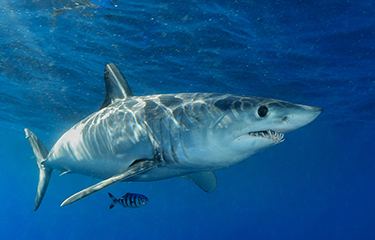The International Commission for Conservation of Atlantic Tuna (ICCAT) wrapped up its 23rd special meeting with agreements on bluefin tuna and shark conservation.
At the meeting – held in a hybrid live and online format in Vale do Lobo, Portugal from 14 to 21 November – ICCAT member-states agreed to establish a management procedure for Atlantic bluefin and set a catch quota for the Southern Atlantic mako shark population.
A “management procedure” or “harvest strategy” is a simulation-tested set of rules used to determine management actions, in which the data, assessment methods, and the harvest control rules for implementing management actions are pre-specified. Harvest control rules (HCRs) are pre-agreed guidelines that determine how much fishing can take place based on the targeted stock’s status. The advantage of using a management procedure is that it is pre-agreed, so political negotiations do not water down science-based recommendations.
In addition to being a step toward more science-based and less political or short-term economic based management for the Atlantic, the move adds momentum to similar proposals for management of Pacific skipjack tuna stocks.
The establishment of a new management procedure for bluefin was applauded by prominent sustainability organizations.
“The MSC wholeheartedly congratulates everyone involved in these lengthy negotiations between multiple nations for their commitment to ensuring bluefin tuna stocks are safeguarded for future generations,” Marine Stewardship Council Chief Executive Rupert Howes said. “We very much hope that the leadership and courage shown by the Atlantic tuna commission inspires delegates from the Western and Central Pacific Fisheries Commission when they meet next week. Progress is urgently needed to agree a workplan and harvest strategies for the long term benefit of all those who depend on tuna from the Western Central Pacific for their income, livelihoods, and nutrition.”
The MSC is calling for progress towards harvest strategies at the annual meeting of the Western and Central Pacific Fisheries Commission (WCPFC) taking place in Vietnam next week. Many MSC-certified fisheries, particularly tuna fisheries in the Western and Central Pacific, have time-bound conditions of certification to implement well-defined harvest control rules. If the WCPFC fails to make commitments to establish a harvest control rule, MSC sustainability certifications in the region will likely be terminated.
At its special meeting, ICCAT also set a quota for the South Atlantic population of mako sharks. A retention ban for the species was adopted for the North Atlantic for 2022 at last year’s ICCAT meeting, and a total catch limit was to be set for South Atlantic blue sharks for 2022. However, mako shark catches were not limited in the South Atlantic at that time.
The agreement stems from a proposal by the E.U. and the U.K. to extend the retention ban on North Atlantic shortfin mako sharks to the South Atlantic, but Namibia and South Africa resisted the move, so short-term catch limits were agreed instead.
“At long last, ICCAT has ended the free-for-all that was South Atlantic mako fishing," Shark Trust Director of Conservation Ali Hood said. "Although more lenient than a ban, the new mako landing limits are well-placed to achieve a substantial reduction in fishing pressure on the South Atlantic population. We thank the U.K. and E.U. for prompting these negotiations and seeing them through to a meaningful result on which we must continuously and ambitiously build.”
Photo courtesy of Xavier ELIAS Photography/Shutterstock







